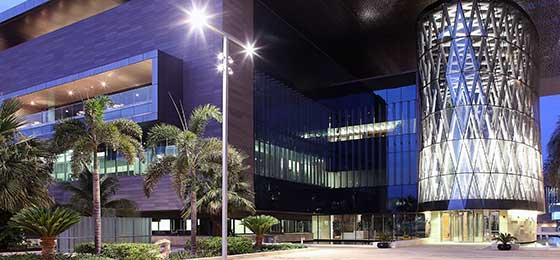Pumping money into science

Saudi Arabia wants to become a leading research nation, and has recently established a multi-billion dollar university. But can science be built from scratch? By Mohammed Yahia
(From "Horizons" no. 108 March 2016)
Some 150 kilometres from the city of Jeddah and off the shore of the Red Sea, a brand new research institute has sprung up in the deserts of Saudi Arabia. It was created to nudge the rich oil country into becoming a knowledge economy by means of science.
The King Abdullah University of Science and Technology (KAUST) was inaugurated in 2009 – a dream of the late King Abdullah who wanted to create a high-tech university to propel scientific research in the country. KAUST is a combination of graduate- level university and research institute and the first co-education facility in Saudi Arabia. Seed funding of 20 billion US dollars has helped furnish it with cutting edge laboratories, which in turn have started to attract leading scientists from around the world. In a short time, it has become one of the leading research institutes in the Arab world.
Unlike neighbouring Qatar and the United Arab Emirates, who opted to attract offshore campuses of established Western universities such as New York University and Weill Cornell Medical College, Saudi Arabia chose to build a university from scratch and to model it after leading private universities in the West.
Funding inspired by ETH and EPFL
"KAUST is really an experiment, a catalyst to do new things. If they are successful, they will be adapted by others, if not, they won't", says Jean Fréchet, who left his position at the University of California, Berkeley, to join KAUST as a vice president for research shortly after its inauguration. Today, KAUST is home to 901 students – nearly 40 percent of whom are women.
One of the founding models used when building KAUST, Fréchet explains, was that of ETH Zurich and EPFL, which receive direct funding from the Swiss federal government. So scientists are getting recurring allowances for their research without having to wait for grants to come in first. "We have both models at KAUST; we depend on grants but also have what we call baseline funding. People really like this model because they know that year in year out they can conduct highly ambitious research and do not have to wait for grants to be allocated."
The combination of generous funding, advanced facilities and visionary goals has attracted well-established scientists from around the world. Jean-Lou Chameau, the current president of KAUST, is the former president of Caltech, while the founding president Shih Choon Fong was the president of the National University of Singapore.
Suzana Nunes, Associate Dean of the Biological and Environmental Science and Engineering Division at KAUST, says: "When I applied to KAUST, I very much liked their assurance that the university would give you the freedom and support to be as good as you can be. The core laboratories offer the possibility for students to be trained but also to work with excellent scientists at the same time".
Fréchet stresses that they are wary of growing too fast and that their ultimate goal is to recruit faculty members who will conduct high-level research and be committed to the goal of the university: "We don't want people to come here as tourists, we want them to come here as contributors".
Part of a bigger plan
KAUST is a part of Saudi Arabia's bigger plan to boost the country's science output. The Kingdom put together a national science plan that started in 2009. It extends into 2030 and is divided into five-year periods with clear deliverables. The first stage, which ended in 2014, was to build a complete infrastructure in the Kingdom to promote and support science in all universities and research institutes.
"We also worked on making sure the research being conducted is of high impact and quality and will have an effect both regionally and internationally", says Abdulaziz Al-Swailem, Vice President of Scientific Research Support at the King Abdulaziz City for Science and Technology (KACST), the institute responsible for putting together the country's science strategy. According to Nature Index, the science output of Saudi Arabia has grown over the past two years to surpass all other states in the Middle East except for Israel.
Al-Swailem recognises that one of the biggest challenges faced by KACST is to create a science culture within the population. Over the past few years, KACST has taken the initiative to translate top science publications and books into Arabic. "We want to create knowledge and make it available for all sectors of society. If we cannot build science within society and create a hunger for it then we will not succeed".
Mohammed Yahia is a science journalist and editor of Nature Middle East. He is based in Cairo.